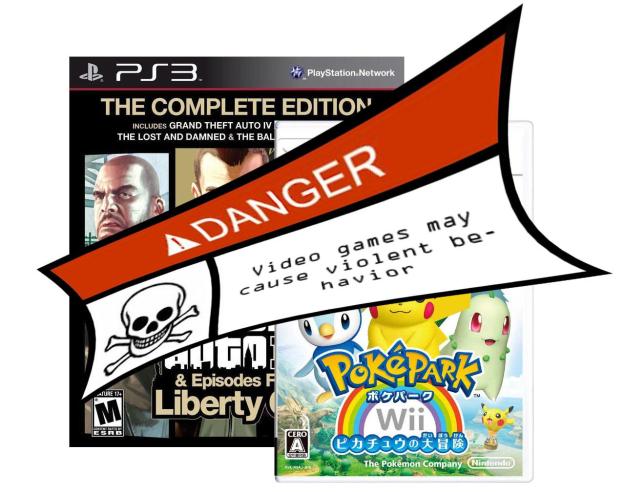
Sometimes, we here at Digital Trends have strong opinions. And when that time comes, we take to the Internet and fight. For this week’s debate, we’re taking on the discussion surrounding the HR 4204 bill, which wants to put warning labels on nearly all video games. Our own Amir Iliaifar and Ryan Fleming go head to head.

Amir |
I’ll start by saying I’m a huge gamer. I’ve been playing videogames for over 20 years and no, I haven’t ever committed an act of violence beside throwing my controller across the room during a very intense Ninja Gaiden 2 boss battle (he was super cheap, FYI). Embarrassing anecdotes aside, I believe video games — like any art form — have the ability to touch, inspire, and influence.

I have read The Collector, and never has it crossed my mind to recreate any aspects of the book. But while I don’t believe games, or books, or films for that matter cause (the key word here being cause) people to commit violent crimes, I do think there can be a correlation between violent images/lyrics/games and violent or aggressive behavior. Jump on Xbox Live and listen to the idiotic, racist, homophobic, xenophobic, etc remarks made by a large number of gamers and tell me that isn’t aggressive or violent behavior.
Do I believe video games should be banned? Hell no. But I don’t see the harm in making consumers aware that there are some potential negative effects of playing violent video games. Where I disagree with the recent labeling proposition introduced by Reps Joe Braca (D-CA) and Frank Wolf (R-VA) and their “Violence in Video Games Labeling Act” is the need to label virtually all games; it should be reserved for games that are deemed explicitly violent by the ESRB and the bill’s wording should be retooled.
Ryan |
This is bill is nothing more than political grandstanding from lawmakers looking to score points with voters in an election year. They attempted a similar thing in California by trying to classify games in the same way they do porn, and the Supreme Court ruled against it.

The law would also force that label on all games, not just violent ones. So beware – don’t let your child play Barbie: Jet, Set & Style!, for it may be a gateway to MURDER!
About The Collector being a focal point of a few nuts, the same was true of Sallinger’s Catcher in the Rye, and yet there are no warning labels on books. You can’t regulate crazy, and if it weren’t a game or a book, it would have been music, movies, or puppies—or any one of a thousand other catalysts that set those guys off. As for XBL’s penchant for young idiots, that is true, but it isn’t just gaming. Read any Yahoo article and weep.
Amir |
I agree that the bill currently is somewhat misleading. As I said, it should be less ambiguous in the proposed warning labels wording. I also think it’s dumb to label anything other than games that are explicitly violent. So don’t worry Ryan, you can play Barbie: Jet, Set & Style! to your heart’s content! However I don’t see any inherent harm in informing consumers, mainly parents, that prolonged exposure to violent games COULD have negative effects on their children’s behavior. While I still believe video games need to be protected, especially when it comes to freedom of speech, they are intrinsically different from other forms of art because of their interactivity. It’s one thing to watch someone stab another in a film and another to actually control that act via a virtual character.
As for the bill being “nothing more than political grandstanding” I can’t speak to that either way, maybe it is, maybe it isn’t. But given that it’s backed by both a republican and democrat, I don’t see how either party will score political points over the other. I also think it’s awfully hubristic to think a lack of scientific consensus automatically deems something wrong. Look at homosexuality: researches said it was a mental disorder well into the 20th century. In fact, in 1952, when the American Psychiatric Association published its first Diagnostic and Statistical Manual of Mental Disorders, homosexuality was included. Even the World Health Organization listed homosexuality as a mental illness in 1977 — only to be removed later in 1990. My points is, just because there is no consensus, doesn’t mean it isn’t real. Do I think we need to place warning labels on everything? Of course not, but the interactivity of video games certainly begs consideration.
And why would this label be so damning? If anything it might spur parents to…gasp…talk to their children about the games they play. I highly doubt a warning label will stop people from playing violent games, (you know, because it works so well with cigarettes) but it might get them to think critically about their behavior in relationship to gaming both good and bad. Gamers need to grow up and realize that there could very well be a correlation between the games they play and violent and aggressive behavior. Not in all, but in some. It’s not the end of the world — and it doesn’t take away any legitimacy from the medium, no more than those crazies did with Salinger’s or Fowles’ work.
Ryan |
You are making my point for me. It was because of political and misguided morale objections to homosexuality that allowed it to be classified as a medical issue. There were no real, lasting studies done, just as there were no real lasting studies done linking gaming to aggression. In both cases it was people in power crashing down on something they did not understand or like, so they tried to make it seem dangerous–unlike cigarettes, which have repeatedly been proven to have a correlation with your health.
Art is typically borne of entertainment, and entertainment can’t grow and progress if it isn’t allowed to push the envelope. Going backward is not an option. The gaming industry is still in its infancy, and yes, many of the games today are developed purely for financial means, not art. But the same is true for movies, and just like with film, each big budget flick makes it easier for developers to create a game that is truly art. If a bill is passed that creates a culture of fear around gaming, and suggests horrible (and unfounded) consequences for playing video games, it could stunt the gaming industry and create a stigma.
It’s happened before. It wasn’t too long ago that people were burning rock n’ roll records, claiming that the devil was present in the sound of electric guitars. Ginsberg’s Howl led to an obscenity trial. Monty Python’s Life of Brian was banned in some areas. All of those things succeeded despite the protests against them, and yet all of the warnings and objections led to a great deal of pain, suffering, and hatred.
This law doesn’t inform, it is meant to terrify. Parents shouldn’t have to be scared and shamed into talking to their kids about violent games any more than they should need a warning label on a range to tell them not to let small children cook without supervision.
Amir |
Yes- there have been many mixed studies and I’m certainly not going to argue that. Neither side can claim to have a definitive answer as to the effect of video game violence. But while some studies have yielded mixed results, there have also been studies that have failed to find significant links of smoking to lung cancer even though the majority of us realize that there is indeed correlation AND causation between smoking and lung cancer.
A simple warning label which states that VIOLENT games MAY lead to violent or aggressive behavior is really not out of line. Yeah we might not know for sure, but there is no harm in being safe. I also think it’s unfair and cynical to say that this law is only meant to terrify. I don’t think that’s the case at all and find it a convenient way to disregard a very plausible negative aspect of violent games.
Just to be clear, I’m not arguing in favor of banning video games or slapping warning labels on everything — just explicitly violent games. I’m merely advocating that both consumers and parents be proactive about video game violence and the effects that it may have. It’s really simple, talk with your kids about the games that they play. Hell – just talk to them about the stuff they are interested in general! With that being said, I fail to see how encouraging dialogue between parents and their kids, be it video games or anything else they show interested in, is in any way shaming.
Ryan |
There is a huge difference between the Surgeon General of the United States issuing a health warning on cigarettes—which many, well-funded researches have shown to cause health problems—and two Congressmen taking it upon themselves to decide that they will issue warnings based on easily refutable, opinionated studies that haven’t been verified.
People tend to read headlines more than actual stories, it’s human nature, so putting that label on a game won’t lead to discussion, it will lead to people believing that games WILL lead to aggression. Maybe not for everyone, but for enough that it will prejudice some about the industry. It would also open the door to further constraints on gaming the next time a politician wanted to appear to be a strong family values proponent.
This bill is unnecessary and sensationalistic. If either Congressman really cared, or had a modicum of responsibility, they would have commissioned a legitimate study on the effects of games and aggression. I’d be interested in the results myself. There is already a warning label of sorts on games now—the ESRB rating. If a game is rated M for mature, parents should be aware of that and talk to their kids because of it. There is no need—and no proof to justify—a Draconian warning that suggests video games will hurt your brain. It is a bad bill from the bottom up.



